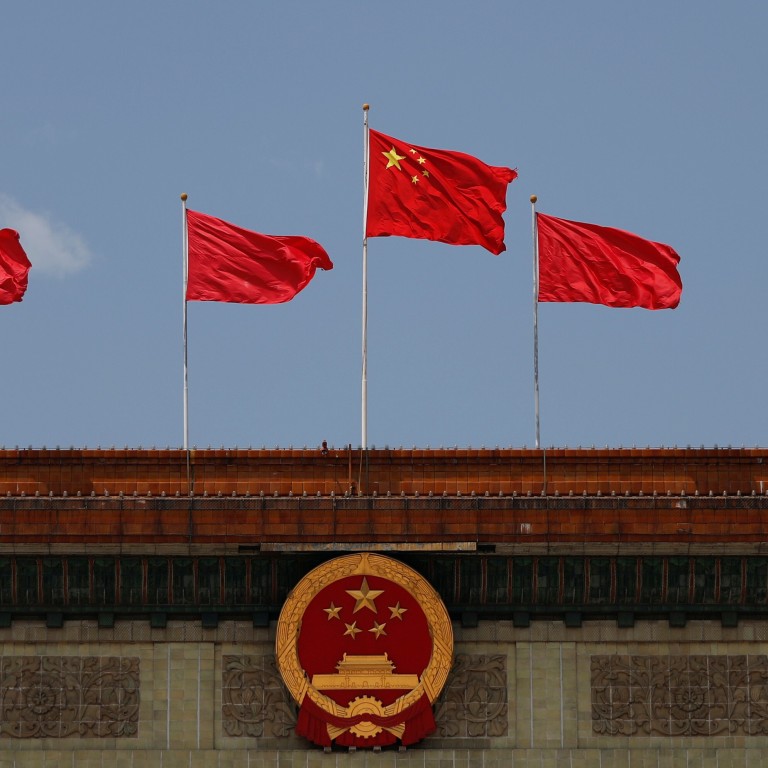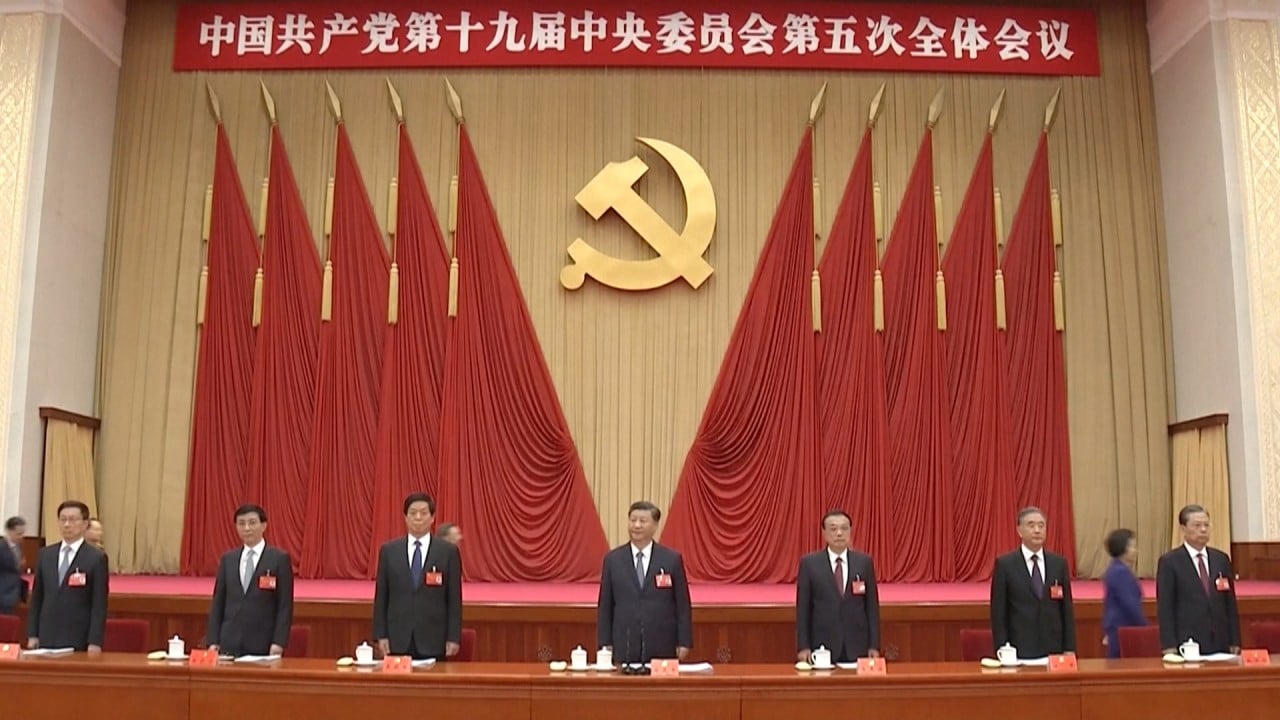
Five-year plan: China moves to technology self-sufficiency
- Rolling coverage of Beijing press conference outlining China’s economic and political goals after crucial plenum
- Five-year plan: China officials flesh out details from plenum communique
China will have to rely more on self-sufficiency in technology as a key factor in managing the fast-changing international environment, a senior Chinese government official said, at a press conference outlining more details on China’s future development plans on Friday.
Wang Zhigang, Minister of Science and Technology, said that, as China entered a new development phase, it would need a new development concept. “It is the first time that a five-year plan has dedicated a specific chapter to technology,” he said.
But Wang said that driving self-sufficiency in technology did not mean China would shut its doors to the world.
“We are willing to work with the world on climate change, energy change, public health, and support global experts on their studies, complete China’s legal environment, better protect intellectual property and try to create a friendly environment for technology innovation in China,” he said.

03:05
What happened at the Chinese Communist Party’s major policy meeting, the fifth plenum?
Hong Kong support outlined
Han Wenxiu, deputy director of the Office of the Central Finance and Economic Commission, said the central government would further support Hong Kong to “consolidate and enhance” its competitive advantage over the course of the 14th five-year plan.
“[We will] build [Hong Kong] into an international innovation and technology centre and create a functional platform for the Belt and Road Initiative. [We will] build the Guangdong-Hong Kong-Macau Greater Bay Area with high quality and improved policies and measures to facilitate the development of Hong Kong and Macau residents in the mainland. [We will] support Hong Kong and Macau to carry out exchanges and cooperation with countries and regions,” he said.
Han said that as long as “one country, two systems is fully and accurately implemented, exchanges and cooperation between Hong Kong, Macau and the mainland are strengthened, and Hong Kong and Macau‘s better integration into the overall development of the country is supported, [we will be able to] maintain the long-term prosperity and stability of Hong Kong and Macau”.
Domestic and external challenges to growth
Ning Jizhe, deputy head of the National Development and Reform Commission, said challenges to China’s economic growth existed both outside and inside the country. “Internationally, it’s the rise of protectionism and unilateralism, domestically, it’s the imbalance of economic development,” he said.
Ning said that, in the next five years, the quality of economic development would be given a higher priority in policy making.
Ning’s institute, the NDRC, will be in charge of drafting the 14th five-year plan based on the plenum’s decisions. The plan will be approved at the annual national legislature’s meeting next year.
Employment recovers after Covid-19
Ning said China’s unemployment rate declined from 9.2 per cent earlier in the year to 5.4 per cent in September. The result was against a backdrop of problems by Covid-19, including unemployment among the country’s migrant workers and food price rises.
“Due to our strong measures, those problems have been alleviated,” he said.
Decoupling from US ‘unrealistic’
Han said a complete decoupling between the US and China was “unrealistic” and “does no good to either country and does no good to the world,” pointing to a 16 per cent increase in US-China trade in the third quarter.
He added that China’s domestic focus needed to be on reform, opening up and innovation. “Only by being technologically self-sufficient and building a strong technology country can we support high-quality development and high quality lives of the people.”
Xi Jinping leads development planning
Han said the 14th five-year plan and the 2035 vision had been drafted under the personal leadership of Chinese President Xi Jinping.
In his opening remarks, Han said Xi had hosted two Politburo meetings, three Politburo Standing Committee meetings and two meetings of the drafting panel. “He has multiple times personally made changes and approved the draft and has put in a tremendous amount of energy on it.”
Han said Xi was team leader of the drafting panel for the 14th five-year plan, with premier Li Keqiang and Wang Huning, the party’s ideology guru, as well as vice-premier Han Zheng as deputy leaders.
How China hopes to win the quantum technology race
Wang Xiaohui, deputy director of the Central Propaganda Department, hailed China‘s successful response to the pandemic, saying the country had “shown with Xi Jinping as the helmsman of the Communist Party and the hard work of the Chinese people, China is set to win over any challenges,” he said.
Wang said the plenum had also established high quality development, supply-side reform, technological self-reliance and the driving up of domestic consumption as key strategies for the next stage of China’s economic development.
Timeline set for ‘great socialist culture’
For the first time, China has laid out a clear timeline for building a great socialist culture by 2035 – one of its long-term visionary goals – according to Wang Xiaohui, deputy director of the Central Propaganda Department.
China’s cultural soft power and comprehensive influence would be further enhanced, he said, with three key tasks for the next five years – to improve the level of social civilisation, to enhance the level of public culture, and to improve the cultural system.
Employment strategy strengthened
Ning Jizhe, member of the ruling Communist Party leading group and vice-chairman of the National Development and Reform Commission, said China would first strengthen its employment strategy in the 14th five-year plan period, expanding expanding capacity and improving employment support for key groups, with the aim of achieving more adequate and higher-quality employment
China would increase incomes for urban and rural residents through multiple channels and keep incomes synchronised with economic growth, he said.
China will focus on self-reliance and cutting risk, says vice-president
The next five years – from 2021 to 2025 – will see a multi-pronged push to raise incomes in urban and rural areas – by building a high quality education system, as well as improving aged care and the social security system, Ning said.
Annual per capita income in Chinese urban areas saw a significant rise from 2016 to 2019, and the income gap between urban and rural area had shrunk, he added.
Ning said China would continue to set a quantitative target for its economic growth rate, with the National Development and Reform Commission proposing corresponding quantitative targets and specific indicators on the basis of careful calculations.
Party to hold daily press conferences
Officials also announced that the all-powerful Central Committee would kick start its own new regular press conferences, from today. Xu Lin, vice-minister of the party’s Central Propaganda Department, said the events would run parallel to the official press conferences organised under the State Council.
Xu, who is also the director of the State Council Information Office, said the intention was to uphold and strengthen the party’s overall leadership. Party press conferences will use red as their background colour, in contrast to the blue background for government events.
No retreat from opening up
Implementation of a “dual circulation” strategy did not mean a retreat from China’s opening up, said Han Wenxiu, deputy director of the Office of the Central Finance and Economic Commission.
The strategy was mentioned by Xi during this year’s two sessions in May and aims to increase the focus on domestic consumption to boost the economy, while balancing it with foreign trade and investment.
Han said strengthening circulation in the domestic economy would help to enhance the resilience of the country’s economic development and would be conducive to driving the domestic economy and international economic cycles to promote each other.
China was in a critical period which would see the country move from the middle-income stage of economic development to become a high-income country, Han said.
Party approval ‘highest in world’
Jiang Jinquan, director of the party’s Central Policy Research Office, said the prime principle in the decisions on the 14th five-year plan was to strengthen the concentrated power of the party.
“A survey showed the approval rating of the Communist Party and the government at 95 per cent – the highest in the world,” he said. “It shows the superiority of China’s political system that China was the first country to control the pandemic and achieve economic growth.”
The press conference was Jiang’s first public appearance in the role since taking over from Politburo Standing Committee member Wang Huning, ranked fifth in the party’s senior leadership, who headed the party think tank from 2002. Jiang, 61, was previously deputy director of the central policy research think tank and holds a PhD in economics.
Observers have been closely watching the fifth plenum which will chart China’s response to its technological and trade war with the United States as well as the already-slowing economy trying to recover from the aftermath of the Covid-19 pandemic.




